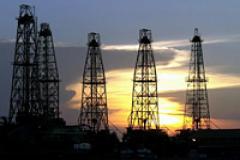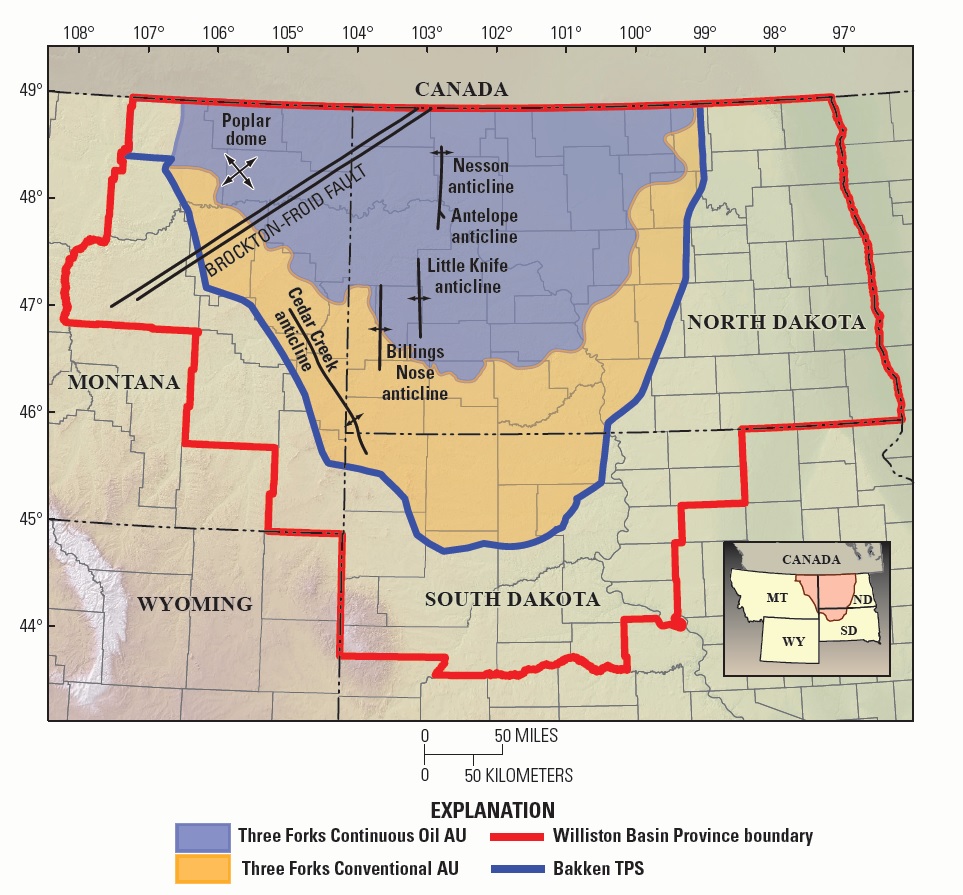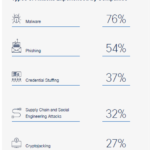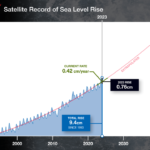Back in the 1970s “experts” unequivocally stated that the world would run out of oil early in the 21st century. Of course they were looking at recoverable oil from traditional exploratory technology at the time. Today, however, it seems we are awash with the stuff. This is both a good and a bad thing.
The atmosphere of our planet needs us to run out of fossil fuels sooner than later. Forcing our hand to develop clean, sustainable energy alternatives is the best way for us to combat growth in greenhouse gases and their consequences – rising temperatures and whacky weather.
But oil and natural gas don’t seem to be a vanishing resource according to the latest estimates of the U.S. Geological Survey. In particular the estimates of recoverable oil from under North Dakota, South Dakota and Montana continue to grow (see map below). In 1995 the number was 150 million barrels. In 2008 the number was 3.65 billion barrels. And now the number is 7.4 billion barrels. And all of this is happening while producers are already pumping oil out of the ground.
Remember these estimates are about recoverable oil using present technology the big innovations being hydraulic fracturing and horizontal drilling. Who is to say that in another decade a new technology will find that there is lots more of the stuff waiting to be sucked out of the ground. Consider resources yet to be exploited like kerogen or methane hydrates and you lose site of an event horizon when our fossil fuel cravings end because there is no more of the stuff to burn.
So blame the innovators in the field of oil exploration for putting humanity in a dilemma similar to “The Lady or the Tiger.”
We can stay with oil, truly the tiger in this metaphor. We can find it. We can get production and pipelines in place. And we can ignore getting eaten by the tiger when the consequences of our burning the stuff causes irreversible damage to the environment.
Or we can choose the lady and commit to her by building a renewable, sustainable, energy infrastructure that will not reverse the consequences of our tigerish behaviour to date, but will at least mitigate the impact on the environment.
We also have to remember that what the U.S. is experiencing is not unique. Other countries too are in the hunt to exploit new fossil fuel sources. Recently I wrote about Japan successfully harvesting methane hydrate from a strip of ocean floor not far from Tokyo. Canada continues to expand its oil sands operations ever increasing the estimates of what can be recovered from this enormous deposit in Northern Alberta and Saskatchewan. Today that number is approaching 2.5 trillion barrels. Venezuela’s Orinoco Oil Belt contains unexploited deposits that currently are estimated to contain 296.5 billion barrels of recoverable oil. Who knows if that number will grow geometrically in years to come as new technologies arise to exploit the resource.
For environmentalists who see the peril in us continuing to find and burn all this Earth-stored carbon to slake our thirst for energy, these numbers are troubling. How can we put the oil and gas genie back in the bottle when the industry continues to go full bore? How can we educate humanity to the peril associated with continued dependence on fossil fuels for energy? How can we get governments to act in the interest of all life on this planet by implementing policies and programs that protect us from ourselves.
Will we be eaten by the oil tiger, or will we find solace for the planet by choosing the renewable lady?


















((How can we put the oil and gas genie back in the bottle when the industry continues to go full bore? How can we educate humanity to the peril associated with continued dependence on fossil fuels for energy? How can we get governments to act in the interest of all life on this planet by implementing policies and programs that protect us from ourselves.))
The short answer to all these questions is, we cannot. The problems are grounded in the inexorable implications of games theory. The situation compares to being a passenger on the RMS Titanic. The alarm has been sounded that there are big holes below the waterline, and the water is flooding in. Some will decide to enjoy the next waltz, glass of wine, and caviar cracker. Others will run about shouting, “Come help us bail.” But most will decide not to spend their last moments of life frantically bailing. The lessons of the Titanic teach us that the bailers drown before the caviar eaters. If you want more bailers, you will need better incentives than the expectation that the bailers will be the first to drown. With China and India constantly enlarging the holes, bailer recruitment becomes increasingly difficult.
I wish you were wrong about human behaviour. But I seriously suspect that your pessimism is more realistic than my optimism. But I will continue to raise the alarm and I figure if enough of us make enough noise, we will awaken those of us who are intelligent and leading to do what is necessary. See, I told you I was an optimist.